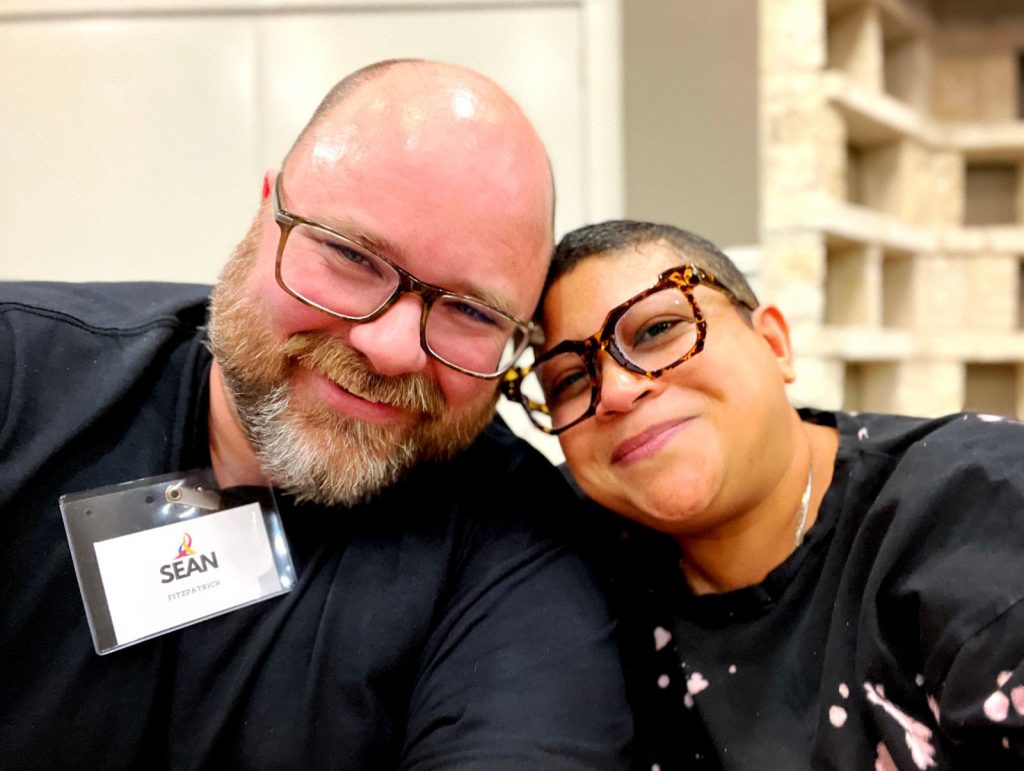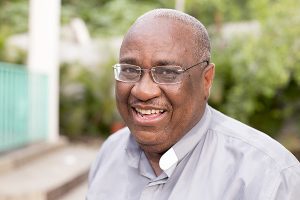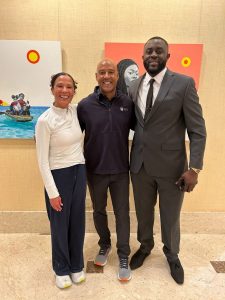
Strangers, Gods and Monsters
September 16, 2024
If you don’t know her, the formidable woman next to me in the photo above is Marjorie Joseph. MJ is Haitian-American. She’s the chair of The Jung Center’s art committee, the former leader of Houston Coalition Against Hate, and a dear friend. (Her mother, Carole Berlotte Joseph, is a renowned higher education administrator who is in Port-au-Prince now, working on the educational future of her homeland, at significant personal risk and cost).
This has been a brutal week for Haitians in America, and a shameful week for Americans. The shame is old; there’s nothing new about Americans choosing an immigrant group to demonize and exclude. If you haven’t followed the news, a demonstrably false rumor that Haitians in Ohio were eating their neighbors’ pets spread like wildfire when referenced in the presidential debate Tuesday night.
I’m writing this out of a well of deep sadness and anger. My connection to Haiti and Haitians is personal. MJ has changed my life. So has Wismick Jean-Charles, the Catholic bishop of Port-au-Prince, who has risked his life again and again in service to his people, and who leads efforts to build community mental health capacity in Haiti that The Jung Center has been privileged to support since 2017.

A deep psychological pattern underlies this awful moment, one that is of course not exclusive to Americans. When we encounter those who are unfamiliar to us, we make nearly-instantaneous decisions that are largely outside of our awareness. Is this person safe or threatening? A case can be made from an evolutionary perspective that difference is in itself suspicious, that we have evolved to be wary.
But of course it is not so simple as that. Yes, we are unconsciously wary, but threat is just as likely to come from those we trust as those we do not know. Many more murders in America are committed by acquaintances than by strangers. And that wariness is momentary. What follows it is our choice, and our work.
The contemporary Irish philosopher Richard Kearney writes that, throughout time, humans have treated those who are new to us as strangers, gods, or monsters, and those designations say more about us than they do about these other people: “Most strangers, gods and monsters… are, deep down, tokens of fracture within the human psyche. They speak to us of how we are split between conscious and unconscious, familiar and unfamiliar, same and other. And they remind us that we have a choice: (a) to try to understand and accommodate our experience of strangeness, or (b) to repudiate it by projecting it exclusively onto outsiders.”
My ancestors were hard-working, religiously devout, and fleeing poverty and famine when they arrived in America. Here, they were caricatured as drunk, rowdy, lazy, and dangerous. “No Irish need apply,” read many job notices in the 19th century. The pattern is old. Today it is being exploited by deeply cynical Americans, aware of their dishonesty, intent on stoking fear to acquire power.
Our experience of strangeness in others is a reflection of our own strangeness to ourselves. It is our work to explore that inner strangeness, the splits, the cut-off parts of ourselves that deserve relationship, the wounds and mysteries we contain. That work is not just an ethical duty; it’s personally liberating and transformative, a path to wholeness for ourselves and for our communities. This is the work we do, and support, at The Jung Center.

One last photo. The two extraordinary men in this photo are both Haitian — Reginald Desroches, the president of Rice University, and Mathieu Jean Baptiste, a gifted, renowned artist based in Houston. The extraordinary woman is Paula Desroches, President Desroches’ wife. Like MJ and Wismick, Mathieu is a vital part of The Jung Center community. His solo show, Dyaspora, meditated on Haitian identity and the complex needs of the Haitian community spread throughout the world. We at The Jung Center were profoundly honored to host the show. And Reginald and Paula purchased one of Mathieu’s works, which now hangs in their home.
Sean Fitzpatrick
The Jung Center

